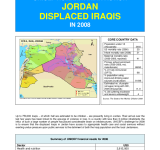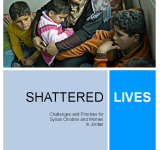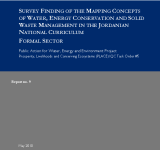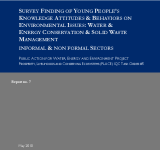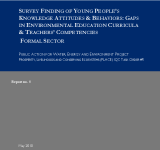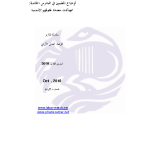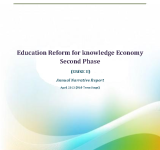teachers
With an executive summary on the Syrian refugees situation in Jordan;; the report combines the conclusions of detailed assessments in various areas including as child protection and gender-based violence;; education;; water sanitation and hygiene;; and nutrition and health. It provides a holistic picture of the situation faced by Syrian children and women in Jordan to draw out recommendations for necessary plans of action. Some key findings of the report include growing challenges for water;; sanitation and hygiene situation in Za’atari camp;; several threats to the nutritional status and health of Syrian girls;; boys and women and increasing violence against adolescents. Bringing together the voices of children and women at the camps;; the report examines the situations of Syrian refugees in host communities and refugee camps and finds key recommendations based on them.
The study aims to evaluate the concepts of water;; energy and solid waste that exists in the curriculum and the manner in which they are tackled by mapping the current textbooks based the three themes of the study – water;; energy and solid waste. The report is based on a comprehensive study of 104 school textbooks from grades 1 – 10 in fourteen subjects. The survey finds that the environmental education concepts were vastly covered in all subjects of he study in a total of 1777 concepts;; and most of them focused on scientific facts and information with repetitive energy concepts and lack of sequential flow. This research was conducted as part of the Public Action for Water;; Energy and Environment Project (PAP);; which aims to encourage water and energy conservation and to support behavior change towards more conservation and efficient practices both at the household level and in the commercial;; industrial and civil society arenas using social marketing behavioral methods. Based on the finding that there is little space allocated to the synthesis and application of information and knowledge and therefore the concepts remain superficially tackled;; the report recommends that support material should be prepared for the different grade levels and training programs should be developed for the teachers as real agent of change and role models.
The report explores the level of knowledge;; attitudes held and practices observed by young people towards environmental issues related to water and energy conservation and sold waste management. It maps out available resources;; programs and learning opportunities in the informal and non-formal education sectors;; through which positive environmental attitudes can be encouraged and promoted. The survey of the report assess the knowledge;; attitudes and practices of young people aged 7 -24;; educations;; staff and youth workers to identify strengths and areas for improvement through capacity building and explore existing resources;; programs to evaluate their effectiveness. This research was conducted as part of the Public Action for Water;; Energy and Environment Project (PAP);; which aims to encourage water and energy conservation and to support behavior change towards more conservation and efficient practices both at the household level and in the commercial;; industrial and civil society arenas using social marketing behavioral methods. The study concludes that there is a need for more “green” programs that involve youth in a proactive way and therefore;; it recommends that programs targeting youth need to remain positive;; dynamic and in context. The recommendations of the report include development of environmental resources in the Arabic language;; the youth-led;; peer-led programs that involve participatory learning opportunities;; and social media tools to raise interests;; awareness and creation of environmental education task force.
The report aims to learn about young people's knowledge;; attitudes;; and behaviors with regards to water conservation;; energy conservation;; and waste management;; and it assess these against the learning objectives of the curriculum. It discovers that students' knowledge was sufficient and at times more sophisticated than that founded in the curriculum even though their attitudes and behaviors remain largely unchanged. The object of the survey pertains to the objectives of the Public Action for Water;; Energy;; and Environment Project;; which revolve around education for young people;; teachers and youth leaders to develop their knowledge and ethical values and attitudes. The survey focuses on assessing young people and educator's current awareness of water and energy resources and waste reduction and evaluating formal curriculum resources. The report points at the gap of translating young people's knowledge into genuine interest;; concern and action and proposes set of targeted actions including development of relevant resources and additional supplemental materials;; age-relevant projects to support environmental concepts in the national curriculum and assignment of environmental coordinator at all schools.
ياتي اصدار هذا التقرير في ضمن سلسلة التقارير الشهرية التي يعدها المرصد العمالي الأردني التابع لمركز الفينيق للدراسات الاقتصادية والمعلوماتية بالتعاون مع مؤسسة "فريدريش ايبرت" الألمانية. وهذا التقرير أصدر في يوم المعلم العالمي;; ويتناول الظروف التي يعمل فيها المعلمون والمعلمات العاملون في المدارس الخاصة ورياض الأطفال في مختلف مدارس القطاع الخاص في الأردن. وكما يتناول أعداداً للعاملين في هذا القطاع وتوزيعهم الجغرافي في مدارس المملكة. واعتمد التقرير على جمع بيانات أولية حول أعداد المدارس الخاصة والعاملين فيها والمعلمين من أكثر من مصدر;; وهذا إلى جانب اجراء العشرات من المقابلات الشخصية مع العديد من المعلمين العاملين في هذه المدارس. وكما قدم التقرير مجموعة من التوصيات التي من شأنها التخفيف من الانتهاكات التي يتعرض لها العاملون في هذا القطاع.
The second phase of the Program Education Reform for the Knowledge Economy Program (ERfKE II) continues to build on the achievements of the first phase and follow the same implementation arrangements that have proven to be successful in (ERfKE I);; and in the same time;; focuses on schools as the locus of change as well as on the need to enhance capacity building at the central and field levels. The development objective of (ERfKE II) is to provide students enrolled in pre-tertiary education institutions in Jordan with increased levels of skills to participate in knowledge economy. Also the Mid-Term review highlighted the concrete progress achieved by (ERfKE II) in several key areas related to policy development;; quality of education interventions and school construction;; and identified the key issues as a summary of the overall progress that will be tackled and addressed during the remaining stage of implementation.
